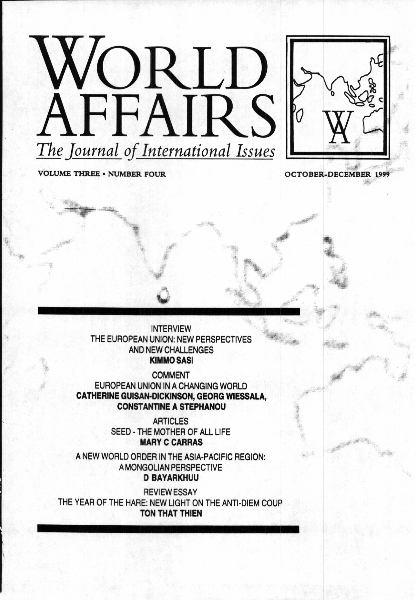
Published in World Affairs: The Journal of International Issues (Vol. 3, No. 4), "The Year of the Hare: New light on the Anti-Diem Coup" is the first review by a Vietnamese scholar. In the review-essay, Ton That Thien, professor emeritus at the University of Hue, observes:
The new light shed on 1963 contributes to a change of interpretation. Clearly, Diem should now be looked upon not as a villain, but as a victim. This change was made possible by the study of reliable and abundant material not available to researchers prior to 1992: official documents including confidential and secret reports, records of internal deliberations, messages exchanged daily, even hourly, between Kennedy and his administration in Washington and the US embassy in Saigon, telling of what actually happened in the months preceding and following the coup in 1963-1964. These documents were declassified and published by the State Department in five volumes between 1988 and 1992, under the title of Foreign Relations of the United States 1961-1964 (FRUS, 1961-1964). In February 1994, the General Records of the US State Department for 1963 also became available. All the above documents have been examined carefully by Winters.
Winters is Associate Professor of Ethics and International Affairs,
School of Foreign Service, Georgetown University, Washington, DC. His study
is very thorough, very enlightening, and probably the most authoritative
one existing on America's policy and role in Vietnam in the period under
consideration - January 25, 1963 to February 15, 1964, Chinese year of
the Hare and Vietnamese years of the Cat. The study is highly authoritative
because it is based not only on in-depth interviews with high-ranking members
of the Kennedy administration, but also, and especially, on a very meticulous
and exhaustive examination of the documents mentioned above.
...
Two observations are in order here. First, the major evident feature
of the narration given by Winters in Part I is that it is special, not
to say unique currently. It is a meticulous, straight forward, comprehensive
record of the deliberations and actions leading to and following the coup,
and the most detailed, illuminating and enlightening account of the conduct
of Kennedy and his officials in the planning and execution of the overthrow
of Diem.
...
Winters adds that the decision to overthrow Diem was taken consciously for moral reasons by the Kennedy officials, and for "political opportunism by President Kennedy himself, who finally decided to allow Diem to be sacrificed on the altar of of American public opinion despite his own lingering sympathy for Diem". (Emphasis added)
Political opportunism, sacrificing Diem to American public opinion,
and the intent to disengage from Vietnam in 1965, are related. They
are very important for a full understanding of the 1963 coup, and we shall
dwell on them here.
...
To enhance his image with both the Right and the Left, Kennedy had to
play along with the American press, which was working up the public against
the Diem regime by printing inaccurate and distorted information. The press
was taking an open position in favour of the Buddhists, although it was
clear by July, and reported by the Saigon embassy itself, that there was
no religious repression but only a political agitation led by a small group
of fanatical Buddhists bent on toppling the Diem government. He also accepted
as true the skewed reports of the anti-Diem activists that the Diem
government was losing the war, that Diem and Nhu were anti-American and
were plotting with Hanoi to "kick the US out". A twin aspect of the coup
as a conscious decision is the planning of this coup. The facts uncovered
by Winters reveal a Machiavellian scheme worked out by the anti-Diem
activists and approved by Kennedy himself It was a vicious two-pronged
operation from which there was no possible escape for Diem.
...
In 1963 the US dealt its ally South Vietnam a fatal blow. In this, Kennedy's policies played a decisive role. This bitter truth has been underscored by the leaders of North Vietnam.
On hearing the news of Diem's overthrow, Ho Chi Minh said: "I could hardly believe that the Americans would be so stupid."
When General Vo Nguyen Giap and his surviving colleagues met with Robert
McNamara in Hanoi in November 1995, they argued that "Kennedy's policies
in Vietnam were terminally mistaken. Ngo Dinh Diem was a nationalist who
would never have allowed the Americans to take over Saigon's war effort,
leading the American and their hapless allies to costly defeat. Therefore
the coup that overthrew Diem in 1963 was the surprisingly early end
for the United States in Vietnam." (reviewer's emphasis).
...
The chapter on Kennedy epitomises what has been said throughout the book. Winters notes the "ruthless side" of the man, his "lack of concern for the destiny of Vietnam his "opportunism", the indifference to the sort of government that might follow Diem, his "ruthless ambition", his "identifying his reelection with the national interest".